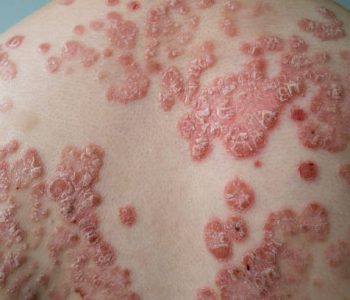- drambalkar@yahoo.co.in
- Mon - Sunday 10:00 AM - 02:00 PM
Guttate Psoriasis Treatment: A Short Introductory Guide
Introduction
Guttate psoriasis is a type of psoriasis that primarily affects the skin, causing red, drop-shaped lesions. While it’s a less common form of psoriasis, it can be distressing due to its sudden onset and visibility. This guide aims to provide a comprehensive overview of guttate psoriasis, its stages, symptoms, potential causes, and treatment options, including effective solutions to stop it from spreading.

What Is Guttate Psoriasis?
Guttate psoriasis is a form of psoriasis that results in small, drop-shaped red or pink patches on the skin, often found on the torso, arms, legs, and scalp. It typically develops suddenly and can be triggered by infections or other factors. Guttate psoriasis is more common in younger people and can sometimes follow a streptococcal throat infection.
Guttate Psoriasis Symptoms
The most noticeable symptom of guttate psoriasis is the appearance of small, round or oval-shaped lesions that are red or pink. These patches may be covered in silvery scales and can appear on various parts of the body, including the back, chest, arms, and legs.
Common symptoms of guttate psoriasis include:
- Red, inflamed patches of skin
- Silvery scales on the lesions
- Itchiness or discomfort in affected areas
- Dry, cracked skin that may bleed
Suffering from Guttate Psoriasis?
We can help!
What Causes or Triggers Guttate Psoriasis?
Guttate psoriasis occurs due to an overactive immune system, which accelerates the growth of skin cells. Under normal circumstances, skin cells grow and shed in a controlled process. In psoriasis, however, the immune system sends faulty signals, causing skin cells to grow too quickly, leading to a build-up of cells on the skin’s surface, resulting in lesions.
What Are the Triggers of Guttate Psoriasis?
Several factors can trigger guttate psoriasis, including:
- Infections: Particularly streptococcal throat infections (strep throat) are a known trigger.
- Stress: Emotional or physical stress can also exacerbate the condition.
- Cold weather: Dry air and cold weather may worsen symptoms.
- Medications: Certain drugs can trigger or worsen guttate psoriasis, such as lithium or antimalarial medications.
- Injury to the skin: Physical trauma, sunburn, or even scratching may trigger an outbreak (known as the Koebner phenomenon).
What Are The Guttate Psoriasis Stages?
Guttate psoriasis progresses through various stages:
- Initial Stage: The condition typically starts suddenly, often following an infection like strep throat. Small, round lesions begin to appear on the skin.
- Progressive Stage: The lesions grow in number and can spread to other parts of the body, causing more discomfort and visible irritation.
- Chronic Stage: In some cases, guttate psoriasis may become chronic, with recurring flare-ups even after initial treatment.
Guttate Psoriasis Diagnosis
A healthcare professional typically diagnoses guttate psoriasis based on a physical examination of the skin and medical history. In some cases, a skin biopsy may be required to confirm the diagnosis, especially if the lesions resemble another skin condition.
What Are the Best Guttate Psoriasis Treatment Options?
Effective treatment for guttate psoriasis focuses on managing the symptoms, reducing flare-ups, and improving quality of life. Here are some common treatments:
1. Topical Steroid Treatments
Topical corticosteroids are commonly prescribed to reduce inflammation and manage flare-ups. They can help reduce redness, swelling, and the formation of new lesions.
2. Topical Non-Steroidal Treatments
For those who cannot tolerate steroids or prefer alternative options, non-steroidal topical treatments like vitamin D analogs (calcipotriene) and retinoids can help control symptoms by regulating skin cell growth.
3. OTC Topical Treatments
Over-the-counter (OTC) treatments such as coal tar, salicylic acid, or hydrocortisone can help reduce scaling and itching associated with guttate psoriasis.
4. Phototherapy
Phototherapy, or light therapy, uses ultraviolet (UV) light to treat psoriasis. UVB light, in particular, can slow down the rapid growth of skin cells and reduce inflammation.
5. Other Medications
In severe cases, doctors may prescribe oral medications or biologics that target specific immune system pathways to reduce inflammation and manage symptoms more effectively.
Are There Any Natural Treatments or Home Remedies for Guttate Psoriasis?
Several natural remedies can complement medical treatments for guttate psoriasis:
- Aloe Vera: Known for its soothing properties, aloe vera gel can help calm inflammation and reduce irritation.
- Apple Cider Vinegar: Diluted apple cider vinegar may relieve itching and promote healing.
- Coconut Oil: Helps hydrate the skin and can be used to manage dry, flaky patches.
- Oatmeal Baths: Can soothe irritated skin and reduce itching.
However, always consult with a healthcare provider before trying natural remedies, as they may not be effective or suitable for everyone.
How to Stop Guttate Psoriasis From Spreading
To prevent the spread of guttate psoriasis, consider the following steps:
- Early Treatment: Begin treatment at the first sign of lesions to control symptoms before they worsen.
- Avoid Triggers: Minimize exposure to known triggers such as stress, infections, and skin injuries.
- Good Skin Care: Regular moisturizing helps keep the skin hydrated and may prevent lesions from spreading.
- Follow Your Doctor’s Advice: Stick to your prescribed treatment plan, including topical medications or phototherapy.
Guttate Psoriasis Complications
If left untreated or poorly managed, guttate psoriasis can lead to complications such as:
- Infection: Open lesions are prone to bacterial or fungal infections.
- Psoriatic Arthritis: Some people with guttate psoriasis may develop joint inflammation known as psoriatic arthritis.
- Emotional and Psychological Impact: The visible nature of guttate psoriasis can cause emotional distress and affect self-esteem.
Conclusion
Guttate psoriasis can be a challenging condition to manage, but with the right treatment approach, it is possible to control flare-ups and prevent it from spreading. Early intervention, appropriate medication, and lifestyle changes can significantly improve the quality of life for those affected.
Get the best treatment for Guttate Psoriasis In Mumbai
Visit Dr Ambalkar’s ARC Bhavan Vasai, our ayurvedic skin hospital In Vasai & Mumbai and start your journey to clearer skin!
FAQs
Q1. What is the main cause of guttate psoriasis?
Guttate psoriasis is often triggered by infections, particularly strep throat, but other factors such as stress, weather, and skin injuries can also contribute.
Q2. How long does it take for guttate psoriasis to heal?
The healing time varies, but with proper treatment, lesions can start to clear up within a few weeks. Chronic cases may take longer.
Q3. Can guttate psoriasis go away on its own?
In some cases, guttate psoriasis may resolve on its own, especially if it is triggered by an infection, but medical treatment is often necessary to manage flare-ups.
Q4. Can diet help with guttate psoriasis?
While diet is not a cure, maintaining a healthy diet can help reduce inflammation and manage symptoms. Avoiding inflammatory foods may be beneficial.
Q5. Is there a cure for guttate psoriasis?
Currently, there is no cure for guttate psoriasis, but treatments can effectively manage symptoms and prevent flare-ups.

Get in Touch with us Today to Begin Your Journey of Transformation

Contact Us
- Dr.Ambalkars Aayurvedic Research Centre, ARC Bhavan, Vijay Vihar Complex, Evershine City, Last Stop, Vasai (E)
- drambalkar@yahoo.co.in
- +91 9320193201
- +91 9766362776

